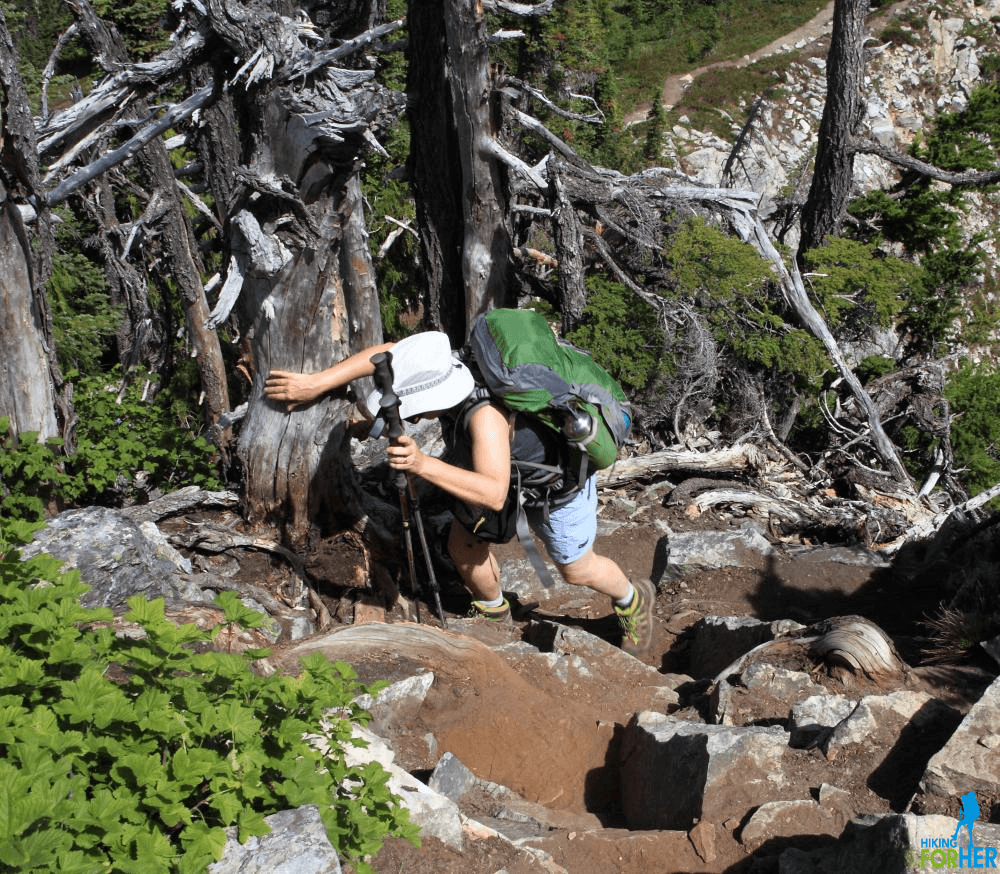Best Backpacking Tents:
Seasons for a Reason!
By Diane Spicer
Backpacking tents: what is all the fuss about "seasons"?
Shouldn't you just focus on price and weight, and let it go at that?
No. That would be a tragic mistake.
Here's why.
Backpacking tents come in many shapes and sizes on purpose.
You need to narrow down your choices based upon how many people (dogs count as people in a small tent, in my opinion) and how much gear you will have on your backpacking trip.
But you also have to pay attention to the season in which you are hiking.
Not all tents can stand up to what Mother Nature can dish out, no matter what the sales person may tell you.
Learn from my
backpacking tent mistakes
Boy, did I learn this the hard way.
Multiple times, actually.
I've been in tents which have:
- blown over in strong wind gusts, leaving me huddled in an increasingly cold sleeping bag until the wind died down;
- collapsed under the weight of rain or snow during the night, resulting in a champion cursing event and a mad scramble for duct tape and a headlamp;
- had the rainfly peel off, slick as a whistle, leaving me exposed to the wet cold conditions until daybreak, when it was safe to pack up and hike back to the trail head;
- allowed an epic amount of water to soak through the flimsy floor, giving me a brief window of entertainment as my air mattress began to float followed swiftly by attempts to flee to higher ground in the corner;
- been chewed into by a ferociously wild mouse which kept me up all night doing acrobatics - s/he literally bounced off the walls and flew over my head. Note to self: never pitch a tent by holes of any kind which appear to be made by mammals;
- leaked like a sieve due to factory sealed seams which weren't so sealed;
- caught on fire (only a little) and melted the door zipper shut (only half way) - please don't ask. (Yes, beer was involved but I was very young and foolish. I got better.)
I could go on, but I'm afraid you'd learn too much about my reckless youth!
Instead, let's look at some of the reasons why the best tents are built around the seasons.
Then we'll consider some of the best backpacking tent tips before you make your purchase.
Backpacking tents
and seasonality
Back to the topic: seasons and what they have to do with choosing your tent.
If you are a solo hiker AND you're going out in mild weather conditions (high summer, late spring, early fall), you can get by with a minimalist structure referred to as a two season backpacking tent.
- Good news, because it won't weigh or cost much, compared to sturdier tents.
Or if you're a "once in a while" backpacker trekking around in good weather, consider this type of tent as your new summer home (unless you're lucky enough to have a cabin in the mountains.... an invitation would be lovely, I can leave in ten minutes.)
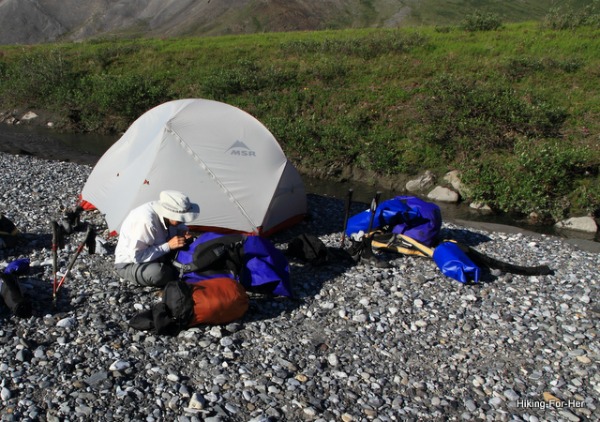 Backpacking tents should stand up to rough usage like gravel bars.
Backpacking tents should stand up to rough usage like gravel bars.But whenever you plan adventures for seasons when the weather is unpredictable, or at high altitude (pretty much the same thing!), you need a sturdier shelter.
And that involves looking at three season -vs- four season tents.
So let's take a look.
Three season tent features
A three season tent promises you:
1. Ventilation options to control (as much as possible) condensation in the tent. These may include:
- two doors,
- multiple windows,
- a mesh ceiling rather than fabric, and zippers to regulate air flow.
2. A rainfly, which in my opinion should be packed and taken along on all trips which fall outside of the golden weather window of high summer. Nothing spells misery more clearly than sitting in a cold wet tent KNOWING that you left the rainfly behind!
3. A ground cloth designed for (or cut to fit) the footprint of the tent floor, featuring grommets for the tent poles to attach to. The ground cloth protects your tent floor from snags and tears, gives you added assurance of a dry night through rainstorms, and provides a bit of insulation in cold weather.
4. Weather proofing options such as a bathtub floor (the fabric comes part way up the walls), factory sealed seams which are durable and have high quality double stitching, and many, many others, dependent upon the price range and brand.
More backpacking tent tips
Three season backpacking tents weigh enough to make you do some serious mental calculations, or look for a hiking partner who can shoulder some of the other necessary gear (stove, food, water filter).
Pay close attention to the construction of the tent poles, too.
- You want strength and flexibility without weight.
- Aluminum -vs- carbon fiber
And don't expect to squeeze more than two of your best friends into a three season tent.
- The weight would be prohibitive!
Four season backpacking tent features
Four season backpacking tents are as good as it gets, in terms of protection from the elements.
Not surprisingly, they weigh and cost a lot more than the other types of backpacking tents.
What do you get for your investment and the effort of hauling around such a heavy tent?
- Peace of mind through any weather, including downpours, snow dumps of wet heavy snow, frigid temperatures, wind gusts that can peel your eyelids back, and other blissfully unpredictable outdoor adventures.
- Did I mention snow? They're great for sheltering you from that! So if you're headed into snowy conditions, or potentially snowy conditions, you need a four season backpacking tent.
Note that 99% of backpackers will not need a four season tent.
But if you're in the minority who like to really push things, ask yourself:
How can one little tent stand up to all that?
Ah! Exactly what the designers ask themselves, year after year, always trying to improve the tent without adding weight.
Look for these features
Look for features such as:
- waterproof but breathable fabrics,
- a tough bathtub style floor,
- a vestibule for gear storage & space to allow you to take off muddy or sandy gear to preserve the tent floor,
- a low profile to avoid wind disasters,
- a relatively small zipped door to avoid exposing the entire contents of the tent to adverse weather conditions, and
- ventilation options without opportunity for snow to drift in and chill you while you sleep.
You definitely want:
- extra tent stakes designed for snow,
- the ability to close off ventilation areas,
- heavy duty tent poles (and plenty of them) to withstand the weight of snow, and
- temperature ratings from the manufacturer exceeding what you are planning on encountering.
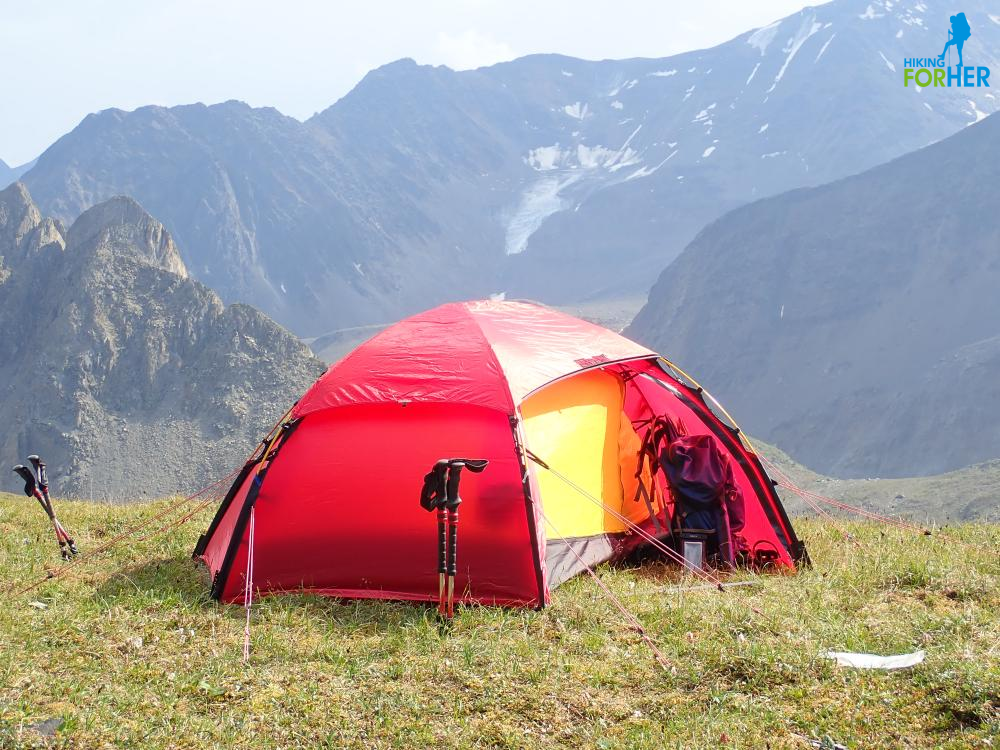
Best tent tips for rugged conditions
You might also want a brightly colored tent, to make it easy to find the tent against the snow if you become disoriented (or during a rescue).
Can you use a four season tent during high summer?
- Only if the tent police aren't watching.
In all seriousness, why would you lug around extra weight when you don't need it?
Be forewarned: serious backpackers own more than one tent. Budget accordingly!
And a note of caution:
Don't try to "make do" with a three season backpacking tent if you are putting yourself in extreme conditions.
- It's a four season tent or stay home scenario, in my humbleopinion.
Unless you like to gamble with comfort and safety, which I'm hoping you're not going to do.
What's the real story behind a backpacking tent purchase?
So there's a lot to think about before purchasing tents, isn't there?
It's not an investment to make lightly, or rush into, because you're relying upon that tent to give you sanctuary in all kinds of weather.
To get the real story about the best tents, turn to backpacking tent reviews.
Gear reviews are always helpful prior to a major hiking gear purchase.
And if you want to read even more about backpacking tents, try this!
Rent before you buy
Not sure you can commit to a tent right now?
Try renting one first.
It's a great way to make your "mistakes" without being saddled with a tent that doesn't work for the type of backpacking you do.
And be prepared!
There will be days, and nights, when you're stuck inside your tent.
Bugs, freezing temperatures, driving rain, exhaustion, you name it!
That's when you'll whip out a great book and snuggle down inside your sleeping bag, right?
- Kindle hiking to the rescue!
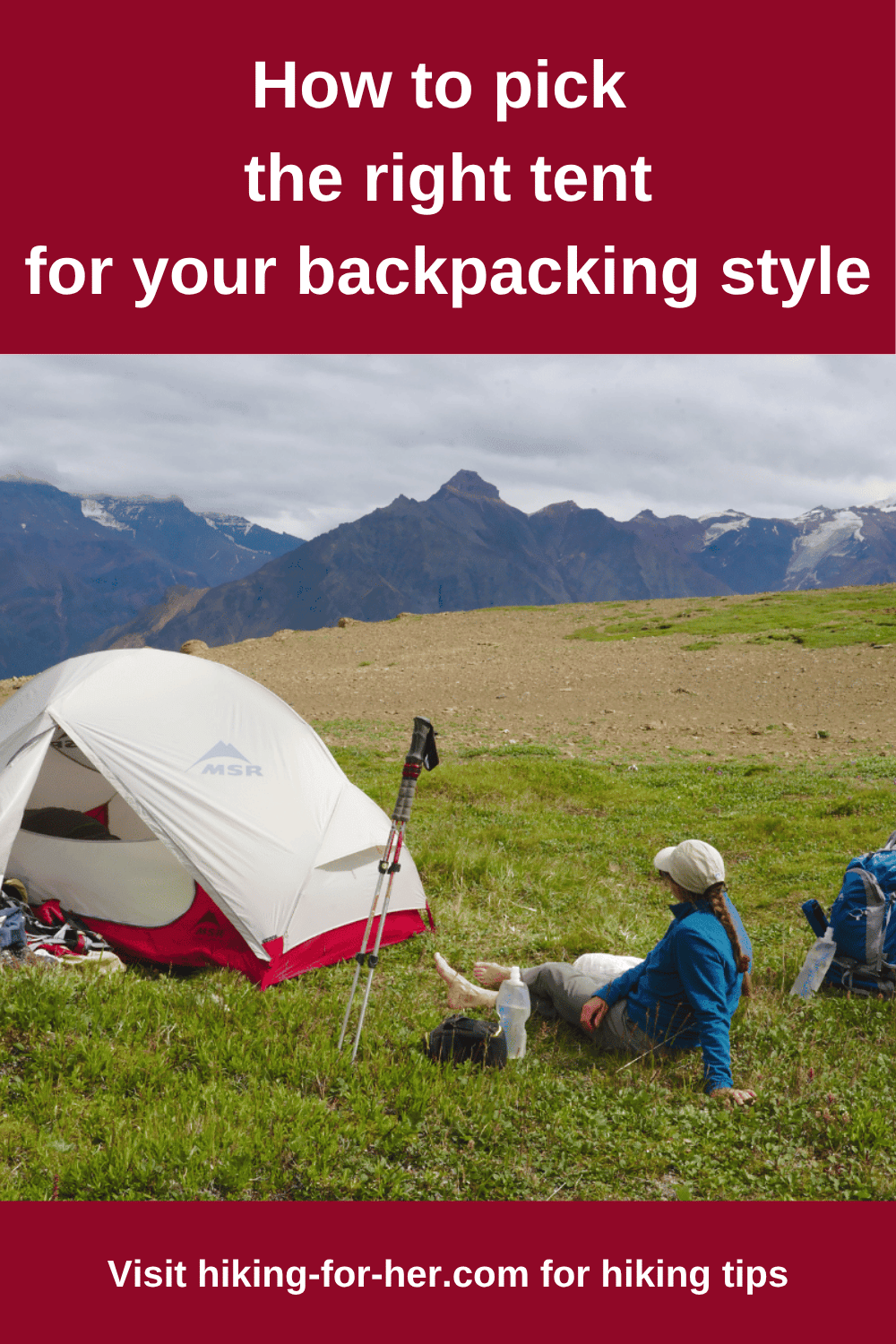
Home page > Best Hiking Gear >
Best Backpacking Tents
|
I get emails all the time about what I wear, eat, carry and love to use on the trail. That's
why I provide affiliate links to you: the best gear that I use myself and have seen used by other hikers is instantly
available for your consideration, and the gear company sends a few
pennies per dollar to this reader-supported hiking website. There is no added cost to you! Everyone ends up a winner: Great gear for you, strong gear companies, and more free hiking tips for everyone. Thanks very much for your support. It's warmly and sincerely appreciated. It also helps send these hiking tips to all your virtual trail buddies around the globe. |
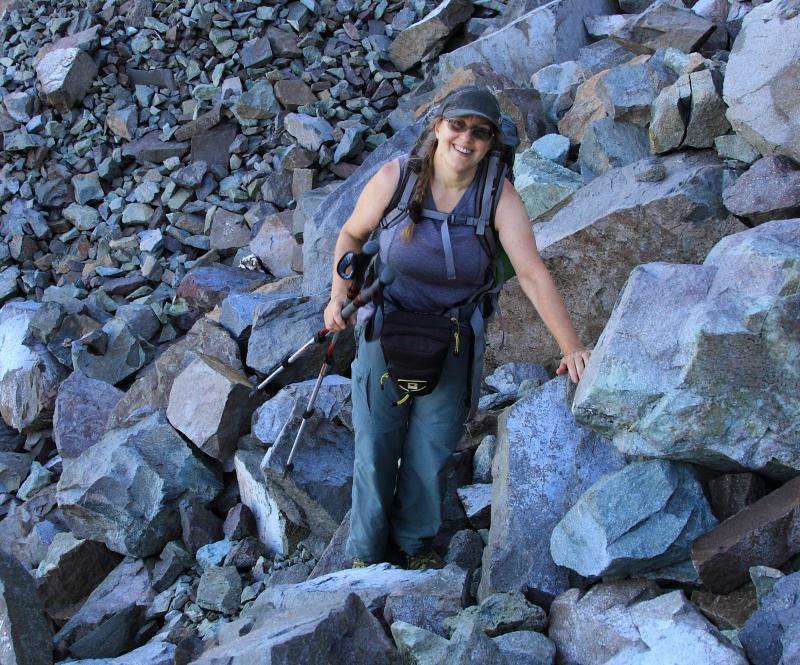 |

